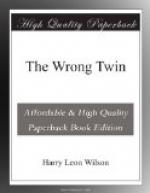“And I’m still a small-towner,” said Wilbur, though delightedly. It was worth being a small-towner to have a brother so splendid.
“We must see a lot of each other from now on,” insisted Merle. “We must get together this way every time I come back.”
“We must,” said Wilbur. “I hope we do, anyway,” he added, reflecting that this would be one of those things too good to come true.
“What I don’t understand,” went on Merle, “you haven’t had the advantages I have, not gone off to school or met lots of people, as I’m always doing, not seen the world, you know, but you seem so much older than I am. I guess you seem at least ten years older.”
“Well, I don’t know.” Wilbur pondered this. “You do seem younger some way. Maybe a small town makes people old quicker, knocking round one the way I have, bumping up against things here and there. I don’t know at all. Sharon Whipple says the whole world is made up mostly of small towns; if you know one through and through you come pretty near knowing the world. Maybe that’s just his talk.”
“Surly old beggar. Somehow I never hit it off well with him. Too sarcastic, thinking he’s funny all the time; uncouth, too.”
“Well, perhaps so.” Wilbur was willing to let this go. He did not consider Sharon Whipple surly or uncouth or sarcastic, but he was not going to dispute with this curiously restored brother. “Try a brassy on that,” he suggested, to drop the character of Sharon Whipple.
Merle tried the brassy, and they played out the hole. Merle made an eight.
“I should have had a six at most,” he protested, “after that lovely long brassy shot.”
Wilbur grinned.
“John McTavish says the should-have-had score for this course is a mar-r-rvel. He says if these people could count their should-have-hads they’d all be playing under par. He’s got a wicked tongue, that John.”
“Well, anyway,” insisted Merle, “you should have had a four, because you were talking to me when you flubbed that approach shot; that cost you a couple.”
“John says the cards should have another column added to write in excuses; after each hole you could put down just why you didn’t get it in two less. He says that would be gr-r-r-and f’r th’ dubs.”
“The hole is four hundred and eighty yards, and you were thirty yards from the green in two,” said Merle. “You should have had—”
“I guess I should have had what I got. Sharon Whipple says that’s the way with a lot of people in this life—make fine starts, and then flub their short game, fall down on easy putts and all that, after they get on the lawn. He calls the fair greens lawns.”
“Awful old liar when he counts his own score,” said Merle. “I played with him just once.”
Wilbur grinned again. He would cheerfully permit this one slander of his friend.
“You certainly can’t trust him out of sight in a sand trap,” he conceded. “You’ll say, ‘How many, Mr. Whipple?’ and he’ll say, ’Well, let me see—eight and a short tote—that’s it, eight and a tote.’ He means that he made eight, or about eight, by lifting it from the rough about ten feet on to the fairway.”




